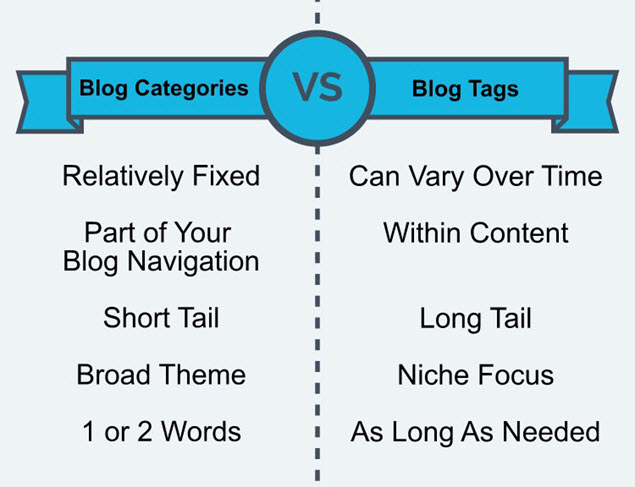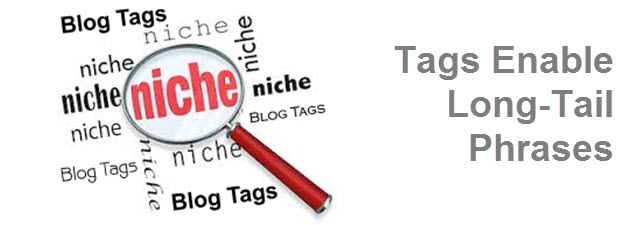Blog Post Tags
Blog Post Tags
Are They Important?
How To Use Them
Most blogging platforms–like WordPress–provide you with the ability to assign tags to your posts. I will refer to these as “blog post tags” so as not to confuse you with other tags (H Tags or Meta Tags for example). To tag a post properly can help your readers and your SEO. Here is some advice.

Blog post tags are part of your blog’s classification structure and organization. WordPress and other blogging platforms use tags as a way to classify and organize information. They provide a reader with a list of posts with more specific groupings of blog topics than are typical by using your blog’s categories.
Think of your blog as a book. The blog categories can be thought of as your blog’s table of contents. Blog tags can be thought of as an index.
For example, if you run a fitness blog, you might have blog categories such as “Diet”, “Workouts”, and “Fitness Tips”. These three terms are perfect as blog categories but they are also rather broad terms. When you write a post and put it in the workout category, you might enter tags like, “pushups”, “squats” and “lunges”, if the post has content about these specific exercises. To use blog tags is helpful to a reader. If someone was seeking advice for a new leg workout then to be able to find posts that contain leg-specific exercises would be very helpful. A reader would appreciate this.
The Value of Blog Post Tags
These blog post tags can be valuable to your site’s visitors and to search engines. For visitors, it improves the usability of your blog in terms of being able to identify posts that cover specific topics. This adds value for your readers. For search engines, it makes interpreting the post’s content easier and can ultimately aid your site in ranking better. This again adds value as content that cannot be found easily is not very valuable.
How Important are Blog Post Tags for SEO in 2016?
Blog post tags can help with general search engine positioning. The actual blog post tag can help improve the search position of the specific post and can also influence and improve SEO indirectly.
To be clear, most search engines don’t rank category and tag pages highly in the search results. However high-quality relevant tagging makes it easier for Google to see what your posts are about.
At this point you may be wondering what a “tag page” is. I will explain. If someone searches your blog for posts tagged with a certain phrase and you have multiple posts tagged using the phrase then your blog will present a page of posts that are tagged using that keyword phrase tag. This is very helpful to readers and sends a powerful signal to the search engines.

Let’s look at a specific example.
Pretend for a moment that you publish a food blog that has a set of posts on the niche topic of “vegan desserts”. You have tagged many blog posts with the phrase vegan desserts. If someone wanted to search your blog for vegan desserts your blog will return a page that then displays all the posts tagged with the phrase vegan desserts. This demonstrates to the major search engines that there is a body of work on the topic of “vegan desserts”. Your blog will be placed higher in the search results for search quires related to vegan desserts.
Furthermore, while tag and category pages aren’t necessarily ranked highly, they are still ranked—meaning they can become a viable traffic source. Blog post tags not only provide you with another source of traffic, they also improve user experience.
Using tags properly in posts makes it easier for visitors to find what they’re looking for on your site. Blog post tags can lower your bounce rate and increase time on site–both behavioral factors that Google takes into account. Tags make a blog or website easier to navigate (when utilized effectively). They provide the user with a convenient way to access relevant content. If a user easily finds what they are looking for, they’re much more likely to stay on your site.
Moreover, if a visitor sees that there is a body of work on a topic they have searched for using a tag search on your blog then they may refer the site to others or bookmark the site. These actions are wonderful for business.
Google’s is significantly focused on user intent and quality of experience. It is working for them so they will continue with this focus or even increase the weighting of user experience and user intent going forward. It makes sense for Google to focus user experience and intent. We need to focus on this as well. To tag posts properly is good for everyone.
Those who don’t think providing a good user experience matters to SEO are quickly falling behind the times.
Summary
My main point it that you must provide a high-quality user experience. You need to compel your visitors to visit multiple pages and stay on your site longer. If you do then you can expect to benefit in terms of SEO. Effective tagging can represent a better more involved user experience and this will ultimately benefit your rankings in search.
